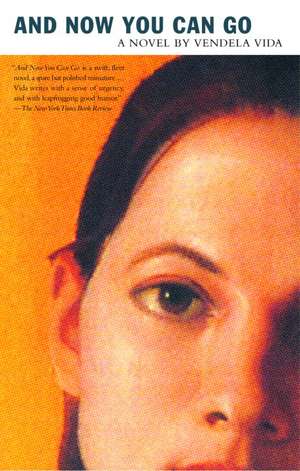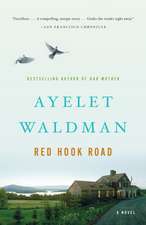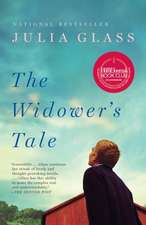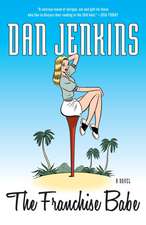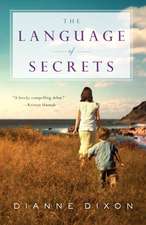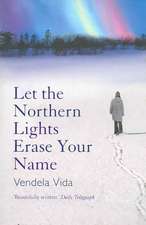And Now You Can Go
Autor Vendela Vidaen Limba Engleză Paperback – 31 iul 2004 – vârsta de la 14 până la 18 ani
Accosted one afternoon in Riverside Park by a man who doesn't want to die alone, Ellis, a young grad student, talks her way out of the situation by reciting poetry to her desperate captor. He lets her go, but is she free? Rejecting the overtures of her kind-hearted boyfriend, the police, and the suitors who would like to save her, Ellis finds herself unable to escape the event. She leaves the city to visit her family; joins her mother on a medical mission to the Philippines. When she returns, Ellis discovers something more about life–perhaps even how to take back her own.
Preț: 96.11 lei
Nou
Puncte Express: 144
Preț estimativ în valută:
18.40€ • 19.99$ • 15.46£
18.40€ • 19.99$ • 15.46£
Carte disponibilă
Livrare economică 31 martie-14 aprilie
Preluare comenzi: 021 569.72.76
Specificații
ISBN-13: 9781400032419
ISBN-10: 1400032415
Pagini: 189
Dimensiuni: 133 x 204 x 14 mm
Greutate: 0.22 kg
Editura: Anchor Books
ISBN-10: 1400032415
Pagini: 189
Dimensiuni: 133 x 204 x 14 mm
Greutate: 0.22 kg
Editura: Anchor Books
Notă biografică
Vendela Vida's first book, Girls on the Verge–a journalistic study of female initiation rituals–grew out of her MFA thesis at Columbia University. She is co-editor of The Believer magazine, and lives in Northern California with her husband. And Now You Can Go is her first novel.
Extras
What Happens When These Things Happen
It was 2:15 in the afternoon of December 2 when a man holding a gun approached me in Riverside Park. I know this because, five minutes before, a mother pushing a sleeping girl in a blue stroller had asked me for the time.
I was twenty-one and had moved to New York that September, knowing no one, and my days were the meekly sunlit rooms of a vacant house. I spent my afternoons in Riverside Park, across the street from my apartment. The trees were tall, and, by December, without birds. In my mind, the story is always in the present, always starting at 2:15. I'm walking along the park's promenade when a man behind me says, "Ma'am?"
I turn around, guessing he needs directions, or that I've dropped a glove. Who would call a young woman ma'am? The man is wearing a black leather jacket, unzipped, and glasses with thin frames. His right hand is tucked into his jacket and he appears to be holding the left side of his waist, like Napoleon. He's large--more wide than tall--and his thick legs step closer. I'm on the promenade and I can hear kids playing with their nannies, with their dogs, and the sound of their laughter is the distance between me and them. I take a step backward, then turn and keep walking in the direction I was before, but faster.
"Ma'am," the voice behind me says. "I have a gun. If you keep walking I'll shoot you. Just do as I say."
I turn back around to face him. I think, I hope, he's joking, until he opens his jacket and shows me the gun in his right hand. I've seen guns before--I've held them in my hands, at a shooting range in Florida, with an old boyfriend before we got orange and lime ice cream. I've felt their weight, been thrown back after firing a .55. But I have never seen a gun pointed at me.
"Do you want money?" I say, and empty out the pockets of my blue coat. The lining is plaid; I don't know if I've noticed this before. I rummage up eighty cents in a shaky hand and offer it to him. "It's all I have," I say. I want to believe money is what he wants.
He looks at my hand as if it has a hole in it. "I don't want your money," he says. "And stop walking away or I'll shoot." I didn't know I was walking away. Now I'm saying "No, no, no," in something like a chant, and I realize I'm not saying no to him, but to the plot I sense developing. I know what happens when these things happen.
There's a wall on the right side of the promenade, parallel to the river, and I imagine that behind this wall is where he'll take me with the gun he'll hold to my head as he rapes me.
"Let's just go over here," he says, and juts his chin toward the wall. I think about making a break for it, about running so fast I can't even look down for fear of stumbling. But I imagine myself being shot in the back. Paralyzed. No, I decide, rape is better.
The man with the gun and I are walking next to each other, along the promenade. We're a couple going for a stroll in the park.
"Let's sit on this bench here," he says. There are two benches: one faces the river and New Jersey, the other faces the park. I'm relieved when he picks the bench that faces the park and the promenade, where there are usually people, where I pray there will soon be people.
"I want to die," he says.
His eyelashes are long. Maybe he doesn't want to kill me. He only wants to die. I've been holding my breath, and I try to exhale without him noticing.
"I want to die," he repeats.
I heard you, I want to shout, but don't. He's staring at the trees in front of us.
"There's nothing," he says.
I wonder what brought him here. Has he been fired? From what job? Something professional--the glasses. Or someone left him. There must be a reason he chose me. A woman left him and I look like her. Maybe there's no reason. I picture a woman who looks nothing like me. I try to place him at a Chinese restaurant or at the head of a table, blowing out birthday candles. But I can't imagine him doing anything but sitting next to me in this park, holding a gun.
"I don't want to die alone," he says.
My hands, still inside my gloves, are soaked with sweat.
"I want to die with someone."
I can smell the leather of his jacket and I see he's wearing glasses that say "Giorgio Armani" in tiny, precise letters on the side. I am going to be killed by a man wearing Giorgio Armani glasses. He takes the gun out of his jacket and puts it to my head.
The pressure against my skull, just above my ear, makes me think I've been shot and there is a bullet going through my thoughts. I picture the only time I saw my mother cry.
I was fifteen and my father was gone. We didn't know where he was. He was still our father, and my parents were not divorced, but now he lived in Minnesota. His explanations were business-related, and he spent some weekends at home. This time he hadn't been in touch in months.
When he finally called one day, the ringing of the phone sounded different--sirenlike, screaming. My mother answered. I knew who it was when she said "Hello" and then stared at the phone, crying. I had never seen her cry before, and it was an ugly sight: the flat planes of her face went limp, shifted like sand. I ran to her, near the kitchen sink, put my hand over hers, and guided the phone back into the cradle.
The man with the gun is waiting for me to say something. But what? I imagine the barrel is an outgrowth of my head: the stem of a thought bubble in a cartoon.
"Maybe you're just having a bad day," I say to him, with a tilted head and hope.
He doesn't say anything. It's quiet for too long.
I smell garlic. It's coming from the gun. Does this mean the gun's recently been fired? Or that it hasn't been used in years? Somehow, this distinction seems important. I look down at the man's Doc Martens, the laces tied in double bows. A few feet over, a used condom has been discarded. I look back at the double bows and then re-tilt my head so it's up against the gun--I don't want him to think I'm trying to get out of this.
Then the gun is down. The man has put the gun in his lap so he can talk. "I feel calm next to you," he says. "You make me feel calm." He's looking at the gun in his hands.
"Calm is good," I say.
"Yeah," he says. "It's good. I feel calm enough to finally die. For us to die together."
I can see people to my right, approaching. A woman and two children. I want them to be three men.
The man is still talking. I watch his chapped lips move and I think, I am still alive. I look toward the woman and children and see they've turned back the other way. Across from me--maybe seventy-five feet in front of me--is a parks service man who is cutting down trees or using a leaf blower. I can't see what he's doing, but he's making so much noise that even if I screamed he wouldn't hear me. And if I did scream, wouldn't the man with the gun shoot?
It hits me: Bookstore. Durer. I'll get the man with the gun to a populated place, where there are people and phones and police. I'll get him to go back to the bookstore with me. I was there three hours before. I was going to buy a book on Durer. Woodcuts! I'll get him excited about woodcuts, or maybe frescoes, and then we'll go to the bookstore, to the oversized-book section, and he won't suspect even for a moment what my agenda is. Or maybe he will suspect, but by then it will be too late. I can suddenly smell the trees we're sitting under.
"You know what?" I say. "There's so much good stuff out there. There's painting!" I feel like a cheerleader gone haywire.
He looks at me blankly.
"There's poetry!" I say, reaching for something, anything.
"Poetry?" he repeats, turning his head toward me, and I feel the tug--he's clamped down on the bait. The relief is intoxicating. I recite Ezra Pound's "In a Station of the Metro" to the man with the gun, speaking slowly and arrhythmically, the way people do at spelling bees. "The apparition of these faces in the crowd;/Petals on a wet, black bough."
My mother made my sister, Freddie, and me memorize a poem a week. She was appalled our schools didn't.
I find myself rambling to him about Yeats's "Leda and the Swan." "Zeus takes the form of the swan so he can seduce Leda," I say. I decide this is wrong--I don't want to give him any ideas. If he does rape me, I think, I'll pretend it's someone else. I'll visualize Tom, my boyfriend of three months. Tom knows everything about presidents. Sometimes he quizzes me: "Who was the only president from New Hampshire?" "Who was number twenty-three?" I try to picture him and wince. I know that whatever happens here, that part of my life, the part with Tom, is now over.
I switch to Frost and talk about that line about two roads diverging in the woods. "That line is quoted in so many high-school yearbooks." Surely he went to high school and had a yearbook, right? "Well, sometimes I wonder if Frost is being ironic, that it doesn't matter what road you ..."
I stop with that thought.
William Carlos Williams is good, I think. More positive. There's his poem my mom loved--the one about the plums--and it comes out of my mouth to the tune of a song by Liz Phair. The man is looking at me through his Armani glasses as though I might be a heroine, a scholar, a prophet. I can't stop the poetry. And then I'm reciting Philip Larkin:
"The difficult part of love Is being selfish enough, Is having the blind persistence To upset an existence Just for your own sake. What cheek it must take."
The man is looking at me like I'm worse off than he is. I'm standing now, hesitantly, no drastic moves, reciting the next stanza:
"And then the unselfish side ..."
I pause. Fuck. "I'm sorry," I say. "I can't remember the rest."
The man with the gun nods. What does that mean, his nodding? That I should be sorry, that things will now be worse? Or that he understands?
"There are things to live for," I plead. "Philip Larkin," I say.
"What's a Philips Larkins?" he says. This strikes me as funny, but I see something in his eyes--some confused interest.
"Let's go up to the bookstore and I'll show you," I say. "We can find the last two stanzas, the part I forgot." I hold my breath.
"Okay," he says.
He says okay.
I get him to start walking to the bookstore with me, all the while imagining how once we're there I'll tell someone--the tall man behind the cash register with a pus-filled infection from his lip pierce, the guy who tells me "Good choice" whenever I buy a book, any book--to call the police and this man will be arrested while reading Philip Larkin. But as we're walking he's still holding his gun and for a moment it's pointed right at me. It's a very long moment.
"Wait," he says.
I stop and hold my hands up as though I'm pledging allegiance with both of them.
"I should put this away." He unzips his black backpack and puts the gun inside like a schoolboy putting away his lunch.
He asks where we're going.
"Up to Broadway," I tell him.
His face is blank.
"Up to Broadway," I say again.
He doesn't even know what part of town he's in. Why did he come here? We're walking up the path and we're almost at the street, almost at Riverside Drive, and I'm trying to get him near the park worker with the leaf blower.
"Look, you can run now. You can go and do whatever you want," the man with the gun says. "I'm sorry. I'm so, so sorry."
But I don't run, because I'm afraid he'll shoot me in the back. Then the man with the gun takes off the opposite way, running toward the smaller-numbered streets, increasing his pace but looking back at me every few strides. When he's far enough away that he can't shoot me, I run hunched over to the park worker. Middle-aged, Hispanic, short. He turns off his loud machine when he sees I'm trying to talk to him.
"I think a man just tried to kill me," I tell him. I say it twice, because the first time I hear myself say it, it doesn't quite seem plausible.
The park worker slides open the side door of his van and I sit on the floor and cover my head. I fear the trees will fall onto the car; I fear the car will fall into the trees.
The driver's door opens and I glance up to make sure it's the park worker. He looks around before getting into the car and I realize he's scared too. He gets on the CB. I'm sitting on the floor asking if he'll just take me back to my apartment. I hear him saying, "Situation bad, situation real bad." He takes me home.
As soon as I get into my apartment I start pacing back and forth in the hall. My roommate, Susan, is trying to understand what's going on. Susan and I aren't friends--when I moved here in September for grad school I started renting a room from her for $550 a month. She hasn't talked to me since the night when, drunk, she told me she'd had anal sex with her cousin on Thanksgiving. She's Catholic and still considers herself a virgin. But now we forget all this. She hugs me, and I smell something familiar: she's helped herself to my perfume. There's a knock at the door and I hide in the kitchen because I think it's him. The man with the gun has followed me home.
From the Hardcover edition.
Recenzii
"And Now You Can Go is a swift, fleet novel, a spare but polished miniature. . . . Vida writes with a sense of urgency, and with leapfrogging good humor." –The New York Times Book Review
"And Now You Can Go is so fast, so mesmerizing to read, and so accomplished that it's hard to think of it as a first novel, which it is–Vendela Vida has promise to spare." –Joan Didion
"Clever and dry and funny. . . . Vida has written a thriller: a thriller about how we love and how we forgive and when and how we have to choose to do so." –The New York Review of Books
“Astonishingly accomplished. . . . Vida creates the stunning impression that relationships are always provisional, even if the most random human interaction has the power to alter–or save–your life.” –Los Angeles Times
“It's a challenge to not fall in love with Vida's characters. . . . Equally humorous and heartbreaking . . . Vida has written an enormously giving and heartfelt exploration." –The Austin Chronicle
"Bewitching. . . . Vida demonstrates tremendous patience, sensitivity and droll humor as she charts the path traveled by her memorably odd hero." –Chicago Tribune
"Ellis charms us with her hyperventilated good intentions, foibles and screwups, her whole essence on the page so real and earnest and gullible, so neurotic, so capable we feel as if we have known her our whole lives." –The Miami Herald
“Vida’s gift lies in her assured grasp of the characters, as wacky as they may be, and in her ability to maintain a sense of humor.” –Milwaukee Journal Sentinel
“A fearless, provocative and surprisingly funny story of implied violence and one woman’s skeptical pursuit of sanctuary. This observant, fast-paced and engrossing work heralds a writer of great talent.” –The San Diego Union-Tribune
"And Now You Can Go is utterly gripping, a book to be read in one sitting." –The Times Literary Supplement (London)
"Vendela Vida's first novel defies expectations in virtually every way; what looks to be a tale of psychological trauma, or even revenge, evolves into something much rarer in contemporary fiction: a joyful investigation of the pleasures of living. And Now You Can Go is beguiling, celebratory, and mysterious." –Jennifer Egan
"Subtle and psychologically acute . . . the stark, wry minimalism of Ellis' voice works in mesmerizing counterpoint to the lunatic situation that engulfs her." –Newsday
"Compulsively readable." –Vogue
“A captivating character study with surprising pockets of wit. . . . Vida has a brilliant eye for the idiosyncrasies and peculiar details that endear her characters to the reader.” –The Plain Dealer
“Wonderful. . . . In addition to its stirring plot and narrator, Vida’s novel offers solid gimmickless prose that shifts deftly according to scene.” –Minneapolis Star Tribune
"And Now You Can Go's narrator is a cool, quirky customer, but she's ever ready to do something generous, something noble, something stamped with grace." –David Schickler
“A quick, intriguing and often funny examination of trauma, human relationships and modern life.” –San Jose Mercury News
“An affecting examination of letting go.” –People
"To call Ellis a meticulous observer is, of course, just another way of praising Vida's skill. . . . Her writing is exceptionally detailed and vivid." –The Washington Post
"It is Ellis's fierce refusal to play the victim that drives this riveting book." –O, The Oprah Magazine
"An existential Perils of Pauline: A young woman is robbed–at gunpoint!–of her ability to feel. Whether or not she can learn anew how to love is the question at the heart of this wonderful new novel. Comedic yet serious, minimalist yet lush–this is an exciting debut." –Jonathan Ames
“Addictive. . . . Vida creates a complex but sympathetic heroine on a voyage and entices you to follow.” –The Boston Phoenix
"Vendela Vida has a talent for getting into the minds of her subjects. . . . Vida knows what people will do and what they won't do and what they find themselves doing anyway pretty damn well." –W magazine
"And Now You Can Go is consistently a pleasure to read." –The Independent (London)
"I was captivated from the first page, compelled to keep reading until I finished in the wee hours of the morning. Vendela Vida's novel is a gift to the reader, a story that contains what I love best about fiction: an idiosyncratic voice, keenly observed gestures, intelligence and heart, and both large and small moments that reverberate in unpredictable ways. And Now You Can Go doesn't let go. It is the debut of a writer with enormous talents." –Amy Tan
“Honest, quirky, and surprisingly compelling.” –Entertainment Weekly
"And Now You Can Go is a book for people who read for pleasure, a book whose beauty lies in its simplicity and sentences that push just enough." –San Francisco Guardian
"And Now You Can Go is so fast, so mesmerizing to read, and so accomplished that it's hard to think of it as a first novel, which it is–Vendela Vida has promise to spare." –Joan Didion
"Clever and dry and funny. . . . Vida has written a thriller: a thriller about how we love and how we forgive and when and how we have to choose to do so." –The New York Review of Books
“Astonishingly accomplished. . . . Vida creates the stunning impression that relationships are always provisional, even if the most random human interaction has the power to alter–or save–your life.” –Los Angeles Times
“It's a challenge to not fall in love with Vida's characters. . . . Equally humorous and heartbreaking . . . Vida has written an enormously giving and heartfelt exploration." –The Austin Chronicle
"Bewitching. . . . Vida demonstrates tremendous patience, sensitivity and droll humor as she charts the path traveled by her memorably odd hero." –Chicago Tribune
"Ellis charms us with her hyperventilated good intentions, foibles and screwups, her whole essence on the page so real and earnest and gullible, so neurotic, so capable we feel as if we have known her our whole lives." –The Miami Herald
“Vida’s gift lies in her assured grasp of the characters, as wacky as they may be, and in her ability to maintain a sense of humor.” –Milwaukee Journal Sentinel
“A fearless, provocative and surprisingly funny story of implied violence and one woman’s skeptical pursuit of sanctuary. This observant, fast-paced and engrossing work heralds a writer of great talent.” –The San Diego Union-Tribune
"And Now You Can Go is utterly gripping, a book to be read in one sitting." –The Times Literary Supplement (London)
"Vendela Vida's first novel defies expectations in virtually every way; what looks to be a tale of psychological trauma, or even revenge, evolves into something much rarer in contemporary fiction: a joyful investigation of the pleasures of living. And Now You Can Go is beguiling, celebratory, and mysterious." –Jennifer Egan
"Subtle and psychologically acute . . . the stark, wry minimalism of Ellis' voice works in mesmerizing counterpoint to the lunatic situation that engulfs her." –Newsday
"Compulsively readable." –Vogue
“A captivating character study with surprising pockets of wit. . . . Vida has a brilliant eye for the idiosyncrasies and peculiar details that endear her characters to the reader.” –The Plain Dealer
“Wonderful. . . . In addition to its stirring plot and narrator, Vida’s novel offers solid gimmickless prose that shifts deftly according to scene.” –Minneapolis Star Tribune
"And Now You Can Go's narrator is a cool, quirky customer, but she's ever ready to do something generous, something noble, something stamped with grace." –David Schickler
“A quick, intriguing and often funny examination of trauma, human relationships and modern life.” –San Jose Mercury News
“An affecting examination of letting go.” –People
"To call Ellis a meticulous observer is, of course, just another way of praising Vida's skill. . . . Her writing is exceptionally detailed and vivid." –The Washington Post
"It is Ellis's fierce refusal to play the victim that drives this riveting book." –O, The Oprah Magazine
"An existential Perils of Pauline: A young woman is robbed–at gunpoint!–of her ability to feel. Whether or not she can learn anew how to love is the question at the heart of this wonderful new novel. Comedic yet serious, minimalist yet lush–this is an exciting debut." –Jonathan Ames
“Addictive. . . . Vida creates a complex but sympathetic heroine on a voyage and entices you to follow.” –The Boston Phoenix
"Vendela Vida has a talent for getting into the minds of her subjects. . . . Vida knows what people will do and what they won't do and what they find themselves doing anyway pretty damn well." –W magazine
"And Now You Can Go is consistently a pleasure to read." –The Independent (London)
"I was captivated from the first page, compelled to keep reading until I finished in the wee hours of the morning. Vendela Vida's novel is a gift to the reader, a story that contains what I love best about fiction: an idiosyncratic voice, keenly observed gestures, intelligence and heart, and both large and small moments that reverberate in unpredictable ways. And Now You Can Go doesn't let go. It is the debut of a writer with enormous talents." –Amy Tan
“Honest, quirky, and surprisingly compelling.” –Entertainment Weekly
"And Now You Can Go is a book for people who read for pleasure, a book whose beauty lies in its simplicity and sentences that push just enough." –San Francisco Guardian
Descriere
This sharply humorous and fast-paced debut novel is about the effects--some predictable, some wildly unexpected--that an encounter at gunpoint have on a (previously) assured young woman.
